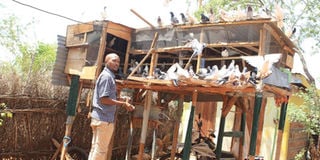Business of keeping pigeons

Dennis Ngugi feeds pigeons at Daniel Kiogora's farm in Mandera. Pigeons feed on millet, maize, groundnuts, wheat, and varied other grains apart from picking insects in the fields. PHOTO | MANASE OTSIALO | NATION MEDIA
What you need to know:
- Pigeons suffer from TB, paratyphoid, cholera, pox and new castle disease influenza.
- A pigeon lays two eggs that are hatched after 18 to 21 days.
- Pigeons feed on millet, maize, groundnuts, wheat, and many other grains apart from picking insects in the fields.
- Diseases are not common among pigeons but it is easy to identify a sick bird.
One hears the sound of birds cooing from a distance as they approach Daniel Kiogoro’s small compound in Mandera.
Inside the compound, the pigeons of various colours fly around in flocks making a beautiful pattern.
Kiogora is one of the pigeon farmers in the arid county keeping the birds for meat and their ornamental value.
“Pigeons require very little space, capital and are not labour intensive as compared to other birds like chickens,” he offers. “They can even be raised in roof of houses,” he says.
He began the trade in 2016 with only a pair which he lost to a wild cat but undeterred, he bought another. Now he has over 180 birds.
“Initially I had not build a good house for them. Now I have a raised structure that is predator-proof.”At the age of six months, the birds start laying eggs and hatch after 18 days.
A pigeon lays two eggs that are hatched after 18 to 21 days.
“There are small cages in the main structure and the pigeon collects grass and small sticks to make a nest when about to lay eggs. The baby pigeon (squab) matures in three to four weeks and can be slaughtered for meat.”
The farmer says the venture is profitable as he sells a pair at Sh500 despite having only used Sh200 to buy his first birds.
The good thing with pigeons is that they quickly multiply. In a year, a bird can hatch more than five times.”
Pigeon only get into cages when brooding and it is normally one at time. They will exchange in a day brooding period between the male and female of the same pair.
The brooding cage can measure 20cm by 30cm. But it will depend also on the size of the pigeon you are keeping
He has been forced to device ways of controlling the birds’ population and curb inbreeding.
EASY TO KEEP PIGEONS
“To control the population, I pick eggs every week but leave a few for hatching. I always check, in case more than 30 birds have laid eggs, I will take at least eggs of 20 birds and leave the rest to hatch,” he says, noting he sells the eggs to those interested in hatching including in Mandera and Meru at Sh50 a pair.
Kiogora says feeding the birds is not a problem as he lets them fly around and forage for feeds.
“I also feed them food leftovers or wheat that I buy and offer them drinking water.”
Pigeons feed on millet, maize, groundnuts, wheat, and many other grains apart from picking insects in the fields.
“You keep food in front of their houses and they will take it by themselves.”

The shed in which Daniel Kiogoro houses his pigeons in his farm in Mandera. He keeps the birds for meat and their ornamental value. PHOTO | MANASE OTSIALO | NMG
A female pigeon will start laying eggs at four to five months and both male and female in a union will collect straws to build a smallest inside their cage.
Once the squab hatches, the mother pigeon will feed it for at least ten days through the beak.
“Within a month, a squab becomes a mature pigeon and can fly around and feed on its own,” says Kiogora.
Diseases are not common among pigeons but it is easy to identify a sick bird.
“A sick bird will isolate itself from the rest of the flock making it easy for you to notice,” he says, isolating diarrhoea as the most common disease affecting the birds. He works with a veterinary officer to treat the birds.
According to Kiogora, pigeons are kept for meat, eggs, ornamental value and for security purposes.
“I love seeing them around as they coo and they alert me in case of any intruder or danger even in the night,” he says.
Daniel Loroperajai, a veterinary officer in Mandera, says it is easy to keep pigeons since they need little space and they hardly fall sick.
“Pigeons if not provided with food they still fly around and find there own making it easy to be kept,” he said.
He adds pigeons fall ill less often compared to other poultry.
“Pigeons suffer from TB, paratyphoid, cholera, pox, influenza and Newcastle disease. Follow the advice of an experienced veterinarian but always keeping the pigeon house clean and germ free,” he says.
To control diseases, one needs to vaccinate the birds timely, keep them free from worms and feed them balanced food to prevent malnutrition.





